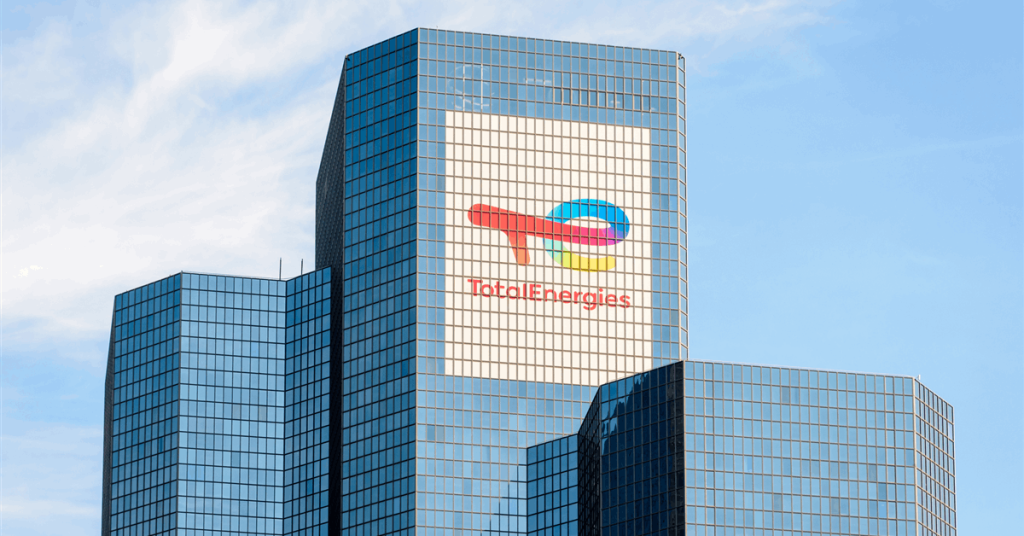TotalEnergies SE agreed to buy a 50 percent stake in a portfolio of European power assets for about EUR 5.1 billion ($5.9 billion), expanding in the sector even as some major oil and gas peers retreat.
Total will acquire the assets from Czech tycoon Daniel Kretinsky’s holding company EPH, paying in new shares, it said in a statement Monday. That will give the Czech firm a stake of just over 4 percent in Total, making it one of the company’s largest shareholders.
The French oil major is bulking up in the power sector as it pursues a diversification drive that targets 20 percent of energy sales from electricity by 2030. It has been acquiring solar, wind and battery projects in Europe and North America, but also gas-fueled plants, betting on soaring electricity demand from the electrification of industry and the artificial-intelligence boom.
The latest deal will give Total gas and biomass power stations and battery projects in Italy, the UK, Ireland, the Netherlands and France. The company now expects its Integrated Power business to generate free cash flow as early as 2027, bringing its forecast forward by a year.
“The deal will give TotalEnergies a critical size in Europe’s power market, make its generation mix more resilient and improve predictability” of cash flows from the electricity segment, Frederic Lorec, an analyst at AlphaValue, said by phone. “The price of the deal makes sense.”
Total rose as much as 0.7 percent in Paris trading, and was up 0.6 percent as of 12:50 p.m. local time.
Power Bet
While electricity demand weakened in parts of Europe in the wake of the 2022 energy crisis, Total is betting on a revival as data centers proliferate, absorbing vast quantities of power. Home heating, transportation and industry are also gradually electrifying across the continent, helping to spur investments in clean energy but also in gas-fired plants as a reliable source of backup power.
The strategy differentiates the French company from UK competitors Shell Plc and BP Plc, which have scaled back commitments to large-scale power investments to focus on higher-return fossil fuels.
Total lowered its forecast for net capital spending by $1 billion a year to as little as $14 billion a year for 2026-2030, of which as much as $3 billion will be earmarked for its power business. The cut in capex may help the company keep a lid on debt – a focus for investors – as a forecast increase in global oil and gas production threatens hydrocarbon prices in the coming years.
The transaction will result in the creation of a joint venture equally owned by Total and EPH, with more than 14 gigawatts of capacity in operation or under construction. The deal is expected to complete in mid-2026, subject to regulatory approvals.
“Through our shareholding in TotalEnergies, we are implementing our strategic ambition to diversify and reduce our geographic exposure, which is currently concentrated in the EU and UK,” Kretinsky said in a separate statement. “EPH intends to remain a long-term strategic anchor shareholder of TotalEnergies.”
Kretinsky, one of Europe’s most prominent dealmakers, built a conglomerate operating in industries ranging from electricity production and distribution to natural gas transmission and storage, trading and logistics. He has recently diversified into French and UK retail, postal services and the media.
What do you think? We’d love to hear from you, join the conversation on the
Rigzone Energy Network.
The Rigzone Energy Network is a new social experience created for you and all energy professionals to Speak Up about our industry, share knowledge, connect with peers and industry insiders and engage in a professional community that will empower your career in energy.
element
var scriptTag = document.createElement(‘script’);
scriptTag.src = url;
scriptTag.async = true;
scriptTag.onload = implementationCode;
scriptTag.onreadystatechange = implementationCode;
location.appendChild(scriptTag);
};
var div = document.getElementById(‘rigzonelogo’);
div.innerHTML += ” +
‘‘ +
”;
var initJobSearch = function () {
//console.log(“call back”);
}
var addMetaPixel = function () {
if (-1 > -1 || -1 > -1) {
/*Meta Pixel Code*/
!function(f,b,e,v,n,t,s)
{if(f.fbq)return;n=f.fbq=function(){n.callMethod?
n.callMethod.apply(n,arguments):n.queue.push(arguments)};
if(!f._fbq)f._fbq=n;n.push=n;n.loaded=!0;n.version=’2.0′;
n.queue=[];t=b.createElement(e);t.async=!0;
t.src=v;s=b.getElementsByTagName(e)[0];
s.parentNode.insertBefore(t,s)}(window, document,’script’,
‘https://connect.facebook.net/en_US/fbevents.js’);
fbq(‘init’, ‘1517407191885185’);
fbq(‘track’, ‘PageView’);
/*End Meta Pixel Code*/
} else if (0 > -1 && 84 > -1)
{
/*Meta Pixel Code*/
!function(f,b,e,v,n,t,s)
{if(f.fbq)return;n=f.fbq=function(){n.callMethod?
n.callMethod.apply(n,arguments):n.queue.push(arguments)};
if(!f._fbq)f._fbq=n;n.push=n;n.loaded=!0;n.version=’2.0′;
n.queue=[];t=b.createElement(e);t.async=!0;
t.src=v;s=b.getElementsByTagName(e)[0];
s.parentNode.insertBefore(t,s)}(window, document,’script’,
‘https://connect.facebook.net/en_US/fbevents.js’);
fbq(‘init’, ‘1517407191885185’);
fbq(‘track’, ‘PageView’);
/*End Meta Pixel Code*/
}
}
// function gtmFunctionForLayout()
// {
//loadJS(“https://www.googletagmanager.com/gtag/js?id=G-K6ZDLWV6VX”, initJobSearch, document.body);
//}
// window.onload = (e => {
// setTimeout(
// function () {
// document.addEventListener(“DOMContentLoaded”, function () {
// // Select all anchor elements with class ‘ui-tabs-anchor’
// const anchors = document.querySelectorAll(‘a .ui-tabs-anchor’);
// // Loop through each anchor and remove the role attribute if it is set to “presentation”
// anchors.forEach(anchor => {
// if (anchor.getAttribute(‘role’) === ‘presentation’) {
// anchor.removeAttribute(‘role’);
// }
// });
// });
// }
// , 200);
//});

